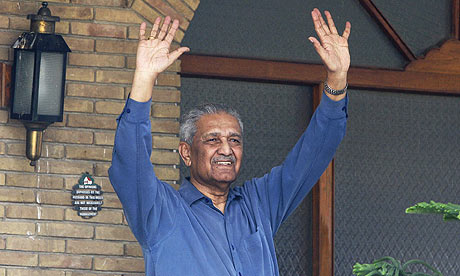
Abdul Qadeer Khan, described as Father of Pakistan’s (or Islamic) Nuclear Bomb, was freed from house arrest by the Islamabad High Court last week. The then president Pervez Musharraf incarcerated Khan five years ago after a great deal of pressure from the international community. However, the recent court judgement threatens to reopen a can of worms.
It reads like a sordid tale of the connivance of the successive US administrations and the Pakistani rulers in shoving under the carpet (for the past three decades) the evidence of nuclear proliferation in countries considered highly unstable/dangerous. And, in a manner of speaking, encouraging terrorism in the world.
The Wikipedia states: “In interviews from May through July of 2008, Khan recanted his previous confession of his involvement with Iran and North Korea. He said President Pervez Musharraf forced him to be a ‘scapegoat’ for the ‘national interest.’
“Khan accuses the Pakistan Army and President Musharraf of proliferating nuclear arms. He said centrifuges were sent from Pakistan in a North Korean plane loaded under the supervision of Pakistani security officials.
“He also said that he had traveled to North Korea in 1999 with a Pakistani Army general to buy shoulder-launched missiles from the government there.
“The Pakistani government’s blanket denials became untenable as evidence mounted of illicit nuclear weapons technology transfers. It opened an investigation into Khan’s activities, arguing that even if there had been wrongdoing, it had occurred without the Government of Pakistan’s knowledge or approval.
“But critics noted that virtually all of Khan’s overseas travels, to Iran, Libya, North Korea, Niger, Mali, and the Middle East, were on official Pakistan government aircraft which he commandeered at will, given the status he enjoyed in Pakistan. Often, he was accompanied by senior members of the Pakistan nuclear establishment.” More here…
The Guardian reports: “Last year a United Nations nuclear watchdog said Khan’s network smuggled nuclear blueprints to Iran, Libya and North Korea and was active in 12 countries. Last month the US state department imposed sanctions on 13 individuals – two of them British – and three private companies because of their involvement in Khan’s network.
“Pakistan has prevented foreign investigators from questioning Khan, insisting it has passed on all relevant information about nuclear proliferation. That bar is likely to remain.” More here…
Photograph above courtesy Mian Khursheed/Reuters
Swaraaj Chauhan describes his two-decade-long stint as a full-time journalist as eventful, purposeful, and full of joy and excitement. In 1993 he could foresee a different work culture appearing on the horizon, and decided to devote full time to teaching journalism (also, partly, with a desire to give back to the community from where he had enriched himself so much.)
Alongside, he worked for about a year in 1993 for the US State Department’s SPAN magazine, a nearly five-decade-old art and culture monthly magazine promoting US-India relations. It gave him an excellent opportunity to learn about things American, plus the pleasure of playing tennis in the lavish American embassy compound in the heart of New Delhi.
In !995 he joined WWF-India as a full-time media and environment education consultant and worked there for five years travelling a great deal, including to Husum in Germany as a part of the international team to formulate WWF’s Eco-tourism policy.
He taught journalism to honors students in a college affiliated to the University of Delhi, as also at the prestigious Indian Institute of Mass Communication where he lectured on “Development Journalism” to mid-career journalists/Information officers from the SAARC, African, East European and Latin American countries, for eight years.
In 2004 the BBC World Service Trust (BBC WST) selected him as a Trainer/Mentor for India under a European Union project. In 2008/09 He completed another European Union-funded project for the BBC WST related to Disaster Management and media coverage in two eastern States in India — West Bengal and Orissa.
Last year, he spent a couple of months in Australia and enjoyed trekking, and also taught for a while at the University of South Australia.
Recently, he was appointed as a Member of the Board of Studies at Chitkara University in Chandigarh, a beautiful city in North India designed by the famous Swiss/French architect Le Corbusier. He also teaches undergraduate and postgraduate students there.
He loves trekking, especially in the hills, and never misses an opportunity to play a game of tennis. The Western and Indian classical music are always within his reach for instant relaxation.
And last, but not least, is his firm belief in the power of the positive thought to heal oneself and others.
















